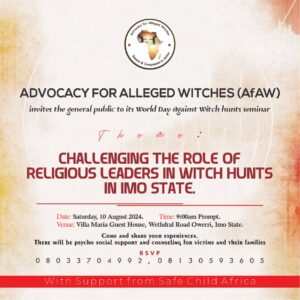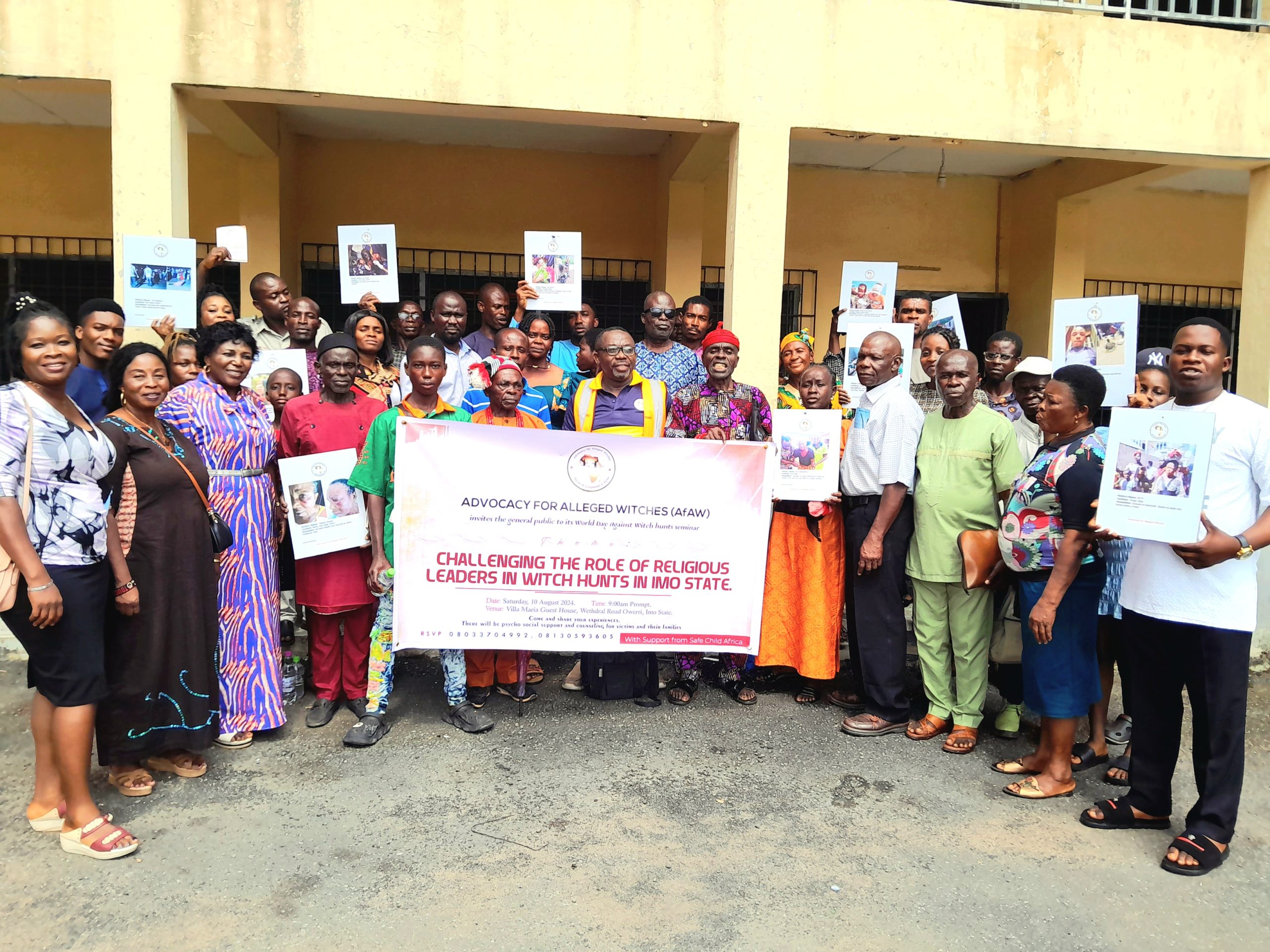By Harriet Ijeomah
The Advocacy For Alleged Witches (AfAW), a non-profit organization dedicated to defending the rights of individuals accused of witchcraft, has renewed its calls for the end of witch hunts in Nigeria and across Africa. To commemorate the World Day Against Witch Hunts celebrated every 10th August, AfAW highlighted the ongoing human rights abuses linked to witchcraft accusations and stressed the need for cultural and intellectual shifts to combat these injustices.

Witchcraft accusations, deeply rooted in various cultural and religious beliefs, have long been associated with causing disease, disaster, and other misfortunes. In many parts of Africa and Asia, epidemics and natural disasters are often interpreted as acts of witchcraft. Such beliefs have led to the persecution, torture, and even killing of individuals, especially children, women, the elderly, and people with disabilities.
Speaking at the event, the Director of AfAW Leo Igwe, emphasized that this day is not a celebration but a time of mourning and reflection. “Today is an opportunity to acknowledge human limitations, the tendency to err in judgment, and to highlight efforts to remedy past and present injustices codified in accusations, persecution, and execution of suspected witches and wizards,” Leo said.
The group pointed out that while the West has largely moved beyond the witch hunts of the past, such practices continue to thrive in Africa due to various religious, cultural, political, and social factors. Despite the persistence of these beliefs, AfAW remains committed to educating communities, challenging religious leaders, and advocating for the rights of those accused of witchcraft.
In a bold move, AfAW’s activities this year focus on the role of religious leaders in perpetuating witch hunts. The theme for this year’s event, “Challenging The Roles of Religious Leaders In Witch Hunt In Imo State,” aims to bring attention to how pastors, priests, diviners, imams, and other religious figures have contributed to these harmful practices. “Many incidents of witch-hunting have been linked to religious actors who claim to have powers to identify and overwhelm ‘witches’. However, there is no evidence that witches exist as popularly believed,” the Director stated.
AfAW’s efforts have not gone unnoticed. In Ubahaeze Orodo, a community in Imo State, stakeholders reported that the organization’s advocacy had a significant impact on their community, enlightening them on the harmful effects of witchcraft accusations. “The awareness created by AfAW has redefined our community and brought light and development to our people. We now recognize each other as human, free from the stigma of witchcraft accusations,” said Obinagwam Solomon, a local leader.

Victims of witchcraft accusations also shared their harrowing experiences during the event. Onyemaobi Michael, an indigene of Ubahaeze Orodo, recounted how he was falsely accused of witchcraft in 2019, leading to the destruction of his property and severe emotional trauma. Another victim, Nzeobi Livinus Okonkwo, described how he was humiliated and paraded on social media by his community, falsely accused of killing his brother through African voodoo.


The National Human Rights Commission in Imo State, represented by Acting State Coordinator Justina Okeke, emphasized the need for proper evidence before making accusations of witchcraft. She urged communities to consult medical practitioners for health issues instead of attributing them to spiritual causes. “False accusations are against national human rights standards, and we encourage victims to report such cases to our office for redress,” Okeke said.
Religious scholar and human rights activist Nwokocha Ogechukwu, who also spoke at the event, acknowledged the controversial nature of witchcraft beliefs but argued that religion plays a crucial role in human existence. He called for a balanced approach that considers the beliefs of all actors while promoting humanistic values.
In a close interview with Stephen Oguji, a philosophy lecturer at Imo State University, commended AfAW’s advocacy, aligning it with his research on how “miracle Christianity” affects African development. He criticized the tendency of some religious leaders to attribute every problem to spirituality, arguing that Africa’s challenges are rooted in bad leadership, unemployment, and poor healthcare services rather than witchcraft or voodoo.
As AfAW continues its campaign, the organization remains steadfast in its mission to end witch hunts, defend the rights of the accused, and educate communities about the dangers of superstition and false accusations.





